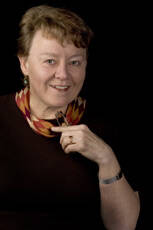This is the story of how a college sophomore, too young to vote or drink, managed to become inebriated from her first big whiff of party politics. Or maybe the story is this: the party-politics bug bit our sophomore, inoculating her for decades against the twin democratic demons of political apathy and cynicism. I’m still working on the interpretation (and I’m still under the influence).
So, Ms. Smith goes to Washington. Plopped serendipitously into the press office, the center of the national campaign, I was immediately aware of my political ignorance. Many on the staff had come directly from the Democratic National Convention in Chicago, which had been marred by the violent treatment of a group of antiwar protestors. I had not been present and did not understand what such violence, along with the national fractiousness over the war, might portend for November. I knew only that, like my parents, I was a Democrat who supported the war on poverty, civil rights for blacks and equal rights for women. Unlike my parents, I was against the war, though my brother served in the Navy.
Now here I was in Washington, not exactly a Humphrey devotee, but eager to learn on the job more about the issues and the candidate. As I prepared news releases and press packets; typed, duplicated, and mailed out the vice president’s speeches; and read through sacks of mail sent to the candidates care of the D.N.C. (some letters were intensely personal and heartfelt), I picked up what I could.
In all innocence, I expected the presidential candidate to inspire me. After all, he represented a democratic ideal I admired: the elected public servant. By definition, this man or woman works long and hard, for less pay than business would offer, to craft and enforce laws that further the common good of all Ameri-cans. Humphrey fit the bill. What I didn’t expect was to be inspired by co-workers.
Yet I saw about me men and women of varying ages, types and career levels who embodied another democratic ideal: the politically active citizen as party worker. These people toiled behind the scenes and within the system. Their hard work, enthusiasm and dedication moved me; all of us worked nearly around the clock as the weeks sped by. And while senior staff members were surely sustained by the hope of the power, status and financial reward victory would bring, they and many staff people at lower levels seemed motivated primarily by nobler civic goals. How ironic that in an era of protest, I began to respect as well the party system and those who worked within it.
The experience did not prompt me to run for office myself or to become a career staffer, but it did ignite my lifelong interest in politics. I minored in government, joined the League of Women Voters, helped friends with their state and local campaigns, worked on many a voter registration drive, edited two magazines that cover politics and never failed to vote. I relish the current campaign, too, even though much has changed since then to tarnish the political system I cherish, such as the overwhelming power of PACs.
Though the Democrats lost the 1968 election, I continue to find surprising the degree to which that single positive experience has influenced my adult actions and views. It didn’t have to be that way. Had I been more objective, perhaps, I might have concluded that party politics is ineffective, that it fails to produce the best candidates. The winner that November, Richard Nixon, eventually resigned the presidency amid impeachment proceedings, and his running mate, Spiro T. Agnew, resigned after being charged with tax evasion.
Why not be cynical? Why cling to the belief that the people’s voice can best be heard through political parties? Because that is a goal worthy of effort and, I would add from experience, a view that can inspire the young.








